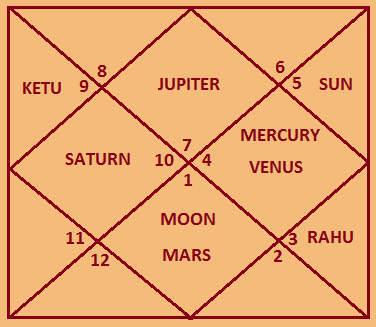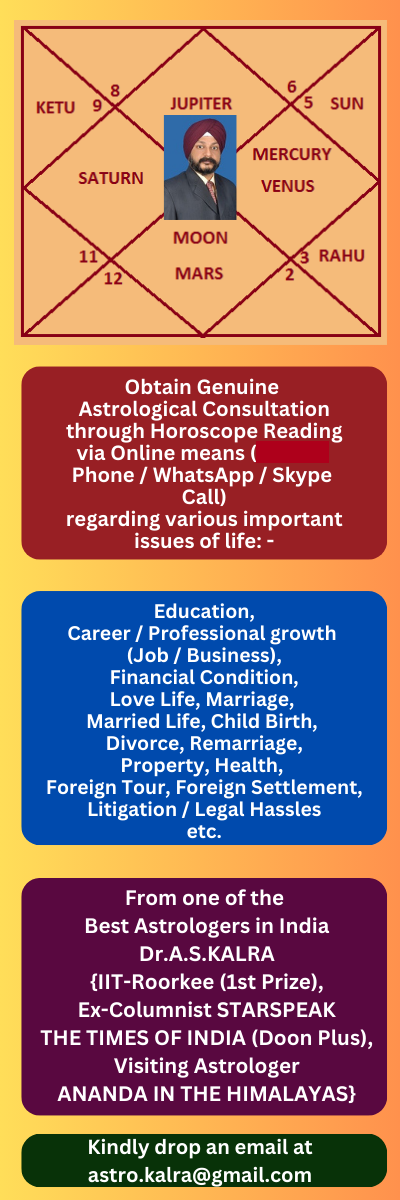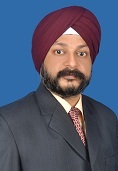Is Astrology Scientific?
Is Astrology Real?



Is Astrology Scientific?
By: - Dr.A.S.Kalra Astrologer
Is Astrology Scientific & Real?
Astrology can be categorized into two main aspects: calculation and prediction. The calculation part of Indian Vedic Astrology is rooted in science as it relies on astronomical calculations. Before delving into whether the predictive part of Indian Vedic Astrology can be considered a science, it is worth examining whether medicine itself is considered a science. Some individuals refer to medicine as medical science without considering if it meets the criteria of scientific principles.Is Modern Medicine a Science?
Medicine is broadly divided into following parts: -
(i) Anatomy
In which the structure of various body organs like heart, brain, kidneys, liver, lungs, pancreas etc. is discussed.
(ii) Physiology
In which the functioning of various organs is discussed.
(iii) Pathology
In which various diseases are studied.
(iv) Practice of Medicine
In which it is discussed how various diseases would be cured.
(v) Preventive Medicine
In which some ways are discussed to take measures in advance to prevent the onset of diseases like polio, typhoid, tetanus, measles.
(vi) Social Medicine
The study of the social, economic, environmental, cultural, psychological & genetic factors.
(vii) Surgery
In which affected organs in the body are removed, replaced or brought into right condition by operative procedures.
(viii) Forensic Medicine
It deals with the application of medical knowledge to aid in the administration of justice or it deals with the medical aspects of law for example in the cases of injuries, hanging, sexual offences, infant deaths & poisoning etc.
(ix) Medical Jurisprudence
It deals with the legal responsibilities of the physician with particular reference to those arising from the physician-patient relationship, such as medical negligence cases, consent rights and duties of doctors, serious professional misconduct, medical ethics etc. In short it deals with the legal aspects of medicine.
The practice of medicine does not fully align with the parameters of science.
In the field of medicine, doctors cannot provide written guarantees or money-back guarantees for treating specific illnesses. Additionally, when a patient with a specific illness seeks consultations from different doctors, there are often differing views and treatments even among practitioners of the same medical system, such as allopathy, ayurveda, homeopathy, unani, or siddha. Sometimes, medical tests or diagnoses yield no clear results, leaving the patient in pain despite their medical condition.
Even if a hundred patients visit a particular doctor, it is unrealistic to expect that the doctor can successfully treat all of them. Patient experiences and opinions of doctors can vary significantly. Furthermore, doctors themselves can fall ill and require treatment for specific diseases. For instance, a heart surgeon may become a heart patient and would not treat themselves. In some cases, patients may experience adverse outcomes due to medical negligence, but this does not lead to doctors abandoning their medical practice.
Similarly, in the field of law, not every lawyer can guarantee a successful outcome for all the cases they handle, including their own personal cases. However, this does not discourage lawyers from continuing their practice.
Professionals in any field have varying success rates. One physician may achieve greater success, while another may have a lower success rate. Likewise, an advocate may win eight out of ten cases they handle, while another advocate may only win five out of ten. Similarly, a teacher guiding a class of 50 students cannot guarantee that every student will secure more than 80% marks in an examination. Some students may score over 90%, while others may struggle to achieve more than 35%.
Sachin Tendulkar, a renowned cricketer, cannot guarantee that he will score more than 100 runs in every match he plays. There are instances when he gets out without scoring any runs. However, this does not deter him from continuing to play cricket. Similarly, Amitabh Bachchan, a celebrated film star in the Indian film industry, may experience film failures despite his talent. Nonetheless, this does not prevent him from pursuing acting in movies.
Ultimately, it is important to acknowledge that success rates differ across professions, including astrology. Some astrologers may achieve higher levels of success, while others may have lower success rates.
Predictive Indian Vedic Astrology: -
Predictive Indian Vedic Astrology is based on the principles laid out by the sage Parashara. While it is not considered a science, it still persists in the world due to some inherent strength or truth. The success of an Indian Vedic Astrologer depends on their ability to accurately provide insights about unknown individuals or their lives, as well as the satisfaction of their clients. However, no astrologer can claim to be 100% accurate. Even renowned astrologer Bejan Daruwalla has acknowledged this fact on multiple occasions. Incorrect predictions can occur when clients provide inaccurate birth details or estimated information with unwarranted confidence. Some individuals fail to recognize the significance of accurate birth details in astrology and do not bother to seek such information from their elders.
An Indian Vedic Astrologer can also experience personal setbacks or unfortunate phases of time in their own lives, indicating that their profession does not guarantee immunity from challenges.
The role of an Indian Vedic Astrologer is not to deceive clients by promising to alter their destiny through remedies such as stones, mantras, tantras, yantras, yagnas, havans, pujas, homams, or donations. Instead, their responsibility is to provide insights into clients' destinies and forewarn them about upcoming favorable or unfavorable periods in their lives. This allows clients to prepare themselves in advance, taking practical measures to minimize negative effects or avoidable situations. However, altering one's destiny is not a simple task and cannot be accomplished without the benevolence of a higher power.
If the remedies suggested by astrologers held such power, it would imply that BJP minister Shri Lal Krishna Advani would have become the Prime Minister of India, and Atal Bihari Vajpayee would not have remained unmarried throughout his life. Former Prime Minister Manmohan Singh never aspired to hold that position, yet he served as Prime Minister of India for two consecutive terms without seeking astrological remedies. Furthermore, remedies could not prevent prominent film star Sanjay Dutt from experiencing various challenges in his life, including the loss of his mother at a young age, health issues due to drug addiction, unsuccessful marriages, and legal troubles resulting in imprisonment.
Considering the limitations observed in these notable cases, it becomes questionable for any astrologer to claim the ability to alter the destiny of ordinary individuals through expensive remedies.
Is it essential to prove Astrology a Science?
Certainly not! The inability of scientists to prove the existence of God does not imply that people will cease visiting temples, mosques, gurudwaras, churches, or other places of worship. Not everything in the universe can be perceived by our five senses or comprehended by our minds. The intricate workings of Astrology, for instance, remain elusive to our complete understanding. Similarly, the mechanisms behind the effectiveness of Homeopathic Medicine are not fully known, yet it has shown remarkable efficacy in numerous cases.
